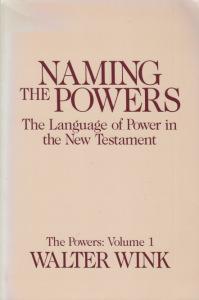 Those of us who became academically aware (in the biblical field) in the 1980s knew the name of Walter Wink.Now, if you’ve ever become academically aware, you know that we all know some names vaguely, as if seen in a glass darkly, and some more intimately.Wink fell into the former category for me.He specialized in “the other testament,” and although I read Greek quite well, my academic track led me through Hebrew to Ugaritic and beyond, in the opposite direction.I taught New Testament in my academic career, but never found the time to go back to Wink.I knew he’d written about “the powers,” and the idea was interesting, but I had other research I was doing and I never got around to him.Now I’ve finally finished the first volume of his famed trilogy on the powers (Naming the Powers).
Those of us who became academically aware (in the biblical field) in the 1980s knew the name of Walter Wink.Now, if you’ve ever become academically aware, you know that we all know some names vaguely, as if seen in a glass darkly, and some more intimately.Wink fell into the former category for me.He specialized in “the other testament,” and although I read Greek quite well, my academic track led me through Hebrew to Ugaritic and beyond, in the opposite direction.I taught New Testament in my academic career, but never found the time to go back to Wink.I knew he’d written about “the powers,” and the idea was interesting, but I had other research I was doing and I never got around to him.Now I’ve finally finished the first volume of his famed trilogy on the powers (Naming the Powers).
“Powers” was a circumlocution for many things in antiquity.It is a high abstraction.Why do you do what you’re told?The powers.They can be human, such as bullies or governments (which are increasingly difficult to distinguish), or they can be supernatural.Much of Wink’s book is technical—this isn’t easy going, even if it’s theology.He looks closely at the terminology of power and exegetes it minutely. The book comes alive, however, in part 3.There were quite a few worthy insights here, but the one that struck me the hardest is how institutions generate a power that no one individual can control or contain, let alone comprehend.As Wink points out, a school isn’t a building.What goes on inside such a building takes on a power that reaches beyond any of the individuals involved in teaching or learning.Think of Harvard.What is it?Who is it?It bears power simply by the citation of its name.No scientist can quantify it, but none will dispute it either.
Thinking about “the powers that be” in this way is transformative.Wink draws this into the ancient perception that what is happening “down here” is merely a reflection of what is taking place on high.Not unique to Christianity, or even monotheism, the idea that our lives reflect the reality of some higher power is pervasive in human thought.And institutions.Harvard, as most prestigious universities, essentially began as a place to train clergy.Even at this stage it began to exert a power.Today Harvard (and many other schools) still hosts a seminary and training ground for clergy.They face a largely unbelieving society when they’re done.And if they’re at all like me, it might take them decades to realize something may be missing.
